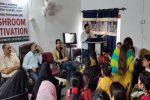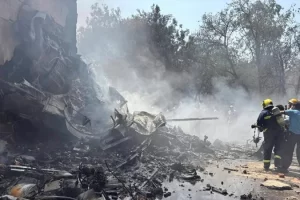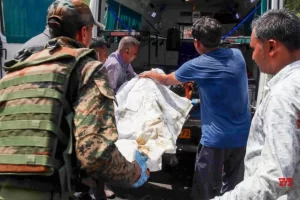Some villagers who had left their hamlets along the Indo-China border in the district decades ago in search of livelihood have begun to return to their homes, showing a pattern of reverse migration.
This change seems to have been induced both by the creation of better facilities in the area in recent years and a renewed awareness of their unique cultural identity, experts said.
Gradual repletion of border villages augurs well for national security, they said.
“Villagers who had abandoned their ancestral homes decades ago in search of livelihood, have now started returning to their roots. It is good for national security as it will revitalise border villages,” says Lalit Pant, a retired teacher and an expert on tribal economy.
“It has been possible due to construction of motor roads to the last posts of the border. Roads have reached the last villages in Johar, Darma, Vyas and Chaundas valleys situated on the border with China in this sector,” said Ashok Nabiyal, an activist of Rang culture in Dharchula.
Besides improved road connectivity, awareness of a dying culture, spread by some cultural organizations and Home stay scheme for tourists introduced by the state government are also responsible for reverse migration.
“The work of Rang Kalyan Sanstha in Darma valley and Malla Johar vikas Samiti in Johar valley, in spreading cultural awareness amongst the indigenous people is also responsible for such tendency,” said Pant.
Sriram Singh Dharmashaktu , president of Malla Johar Vikas Samiti and permanent resident of Milam village, has identified his land in the village and wants to live there during the summer season.
“I have repaired my ancestral house in Milam and will settle there,” said Dharmasaktu, a retired BSF Commandant.
Digvijay Singh Rawat, a retired FCI officer, and resident of Milam village, has constructed a new house in Milam village after his retirement.
“Though I have a house in Haldwani, I will live in Milam village which is my ancestral home,” said Rawat.
In Darma valley of Dharchula sub division of the district, several residents who had left their villages decades ago to settle outside are returning to their ancestral villages.
“After the road connectivity reached the last village of Darma valley, we started plantation of apple trees in several villages of the valley as the climate of valley is ideal for apple plantation.” said Ram Singh Sonal, a retired railway officer who now resides in his ancestral village of Son in Darma valley and wants to convert the valley into an apple orchard.
Mohan Singh Gunjyal, an Everest climber and a Padmashree awardee for his contribution in the field of mountaineering, spends most of his time during summer in his native village Gunji, after his retirement from ITBP.
“The Vyas valley villages will be fully vitalized after under construction Ghatiabagar to Lipulekh road gets completed in 2020,” said Mohan Singh Gunjyal.
Out of 600 families in all 14 villages of Johar valley before 1962, an average of 40 percent families have permanently settled out of their ancestral villages, in Munsiyari, Pithoragarh, Haldwani, Dehradun, Almora and New Delhi, while a total of 140 families have maintained the tradition of rearing sheep and of reaching their villages in summer months to cultivate their fields.
People in these border valleys say if Government provides them facilities of medical care, communication and transport, all villages on the border will be vitalized with people .
“At least the retired people and young unemployed of Rang tribe will settle in these villagers to earn through home stay tourism and growing medicinal plants,” said Mohan singh Gunjyal.
Munsiyari SDM Bhagat Singh Fonia has said the tendency to return to villages has been seen over the last 5 years after the roads to the last border posts began to be constructed.
“If facilities of transport communication and electricity increases in border region, the villagers, at least the retired ones, will start residing in their ancestral villages,” the Munsiyari SDM said.
The SDM, who is a permanent resident of a border village in Chamoli district, has said he will also settle down in his village after retirement.
The state migration commission has in its recent report said that a total of 41,669 families from villages in Pithoragarh district have migrated to either the district headquarters or in other districts over the last 20 years.
























